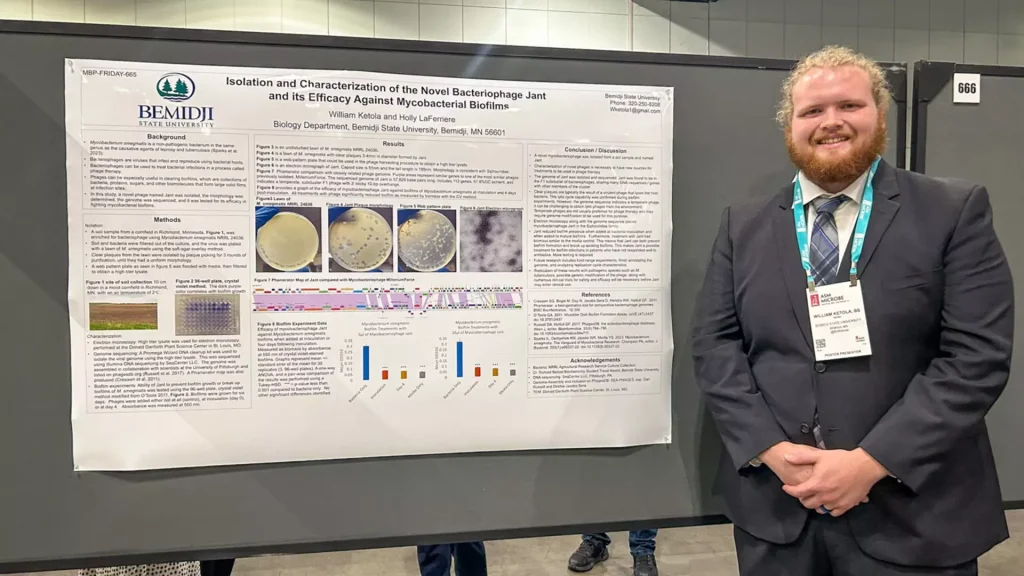College Football Player’s Discovery Could Aid in the Fight Against Tuberculosis

In the unassuming world of soil and bacteria, a college football player from Bemidji State University has made a scientific discovery that could one day have a significant impact on global health. Bill Ketola, a senior biochemistry major and a member of the Beaver football team, has successfully isolated and characterized a previously unknown virus, a bacteriophage, that shows promising signs of being able to combat tuberculosis. His journey from the gridiron to the laboratory is a testament to the unexpected places where breakthrough research can begin.
The Power of Phages
Viruses are everywhere, yet a vast number of them remain a mystery to science. According to Dr. Holly LaFerriere, a professor of biology at Bemidji State, “Not a lot of them have actually been isolated or characterized.” This is a crucial point in the face of a growing global health crisis: antibiotic-resistant bacteria. As traditional antibiotics become less effective, scientists are turning their attention back to bacteriophages—viruses that specifically target and destroy bacteria without harming human cells.
These tiny bacterial hunters were first discovered in the early 20th century and were used with great success to treat infections like dysentery and cholera during World War I. However, the discovery of penicillin and other antibiotics led to a shift in medical research, as antibiotics were easier to produce and widely successful. Now, as the threat of “superbugs” looms, phage therapy is re-emerging as a vital area of study.
This is where Bill Ketola’s work comes in. During his research in LaFerriere’s Advanced Research Project course, he became part of a larger, global effort to discover and characterize these novel viruses. His work has not only added a new virus to the scientific catalog but has also provided a new tool with the potential to fight one of the world’s most enduring infectious diseases.
The Path to a Breakthrough
For Ketola, the road to this discovery was an unexpected one. He originally came to Bemidji State for the football program, drawn by the campus and the coaching staff. But once there, he found a second passion in the academic and research opportunities, particularly in the biochemistry department.
His discovery started, fittingly, during a football bye week. He was visiting his fiancé’s family in Richmond, Minnesota, when he noticed the rich, moist soil in a nearby cornfield. Knowing that these were the optimal conditions for bacteria and their viral predators to thrive, he took a soil sample. “I was very excited, because that was actually the third time that I had taken a soil sample,” he said. “When I finally walked into the lab and looked into my Petri dish and saw the plaques, I was very excited to see that I had been successful.”
The plaques he saw were clear spots in the bacterial culture, indicating that something was killing the bacteria. That something was a phage. Because it was a brand-new discovery, Ketola earned the right to name it. He chose “Jant,” a combination of the names of two of his favorite professional athletes, Justin Jefferson and Anthony Edwards. LaFerriere praised his natural aptitude for the lab, what she calls “lab hands,” which allowed him to perform the delicate work with ease.
A Potential Weapon Against Tuberculosis
Ketola’s research confirmed that his newfound bacteriophage is a lytic phage, meaning it can successfully infect and kill its target bacteria. His work focused on Mycobacterium smegmatis, a harmless bacteria that is often used in labs because of its strong similarities to Mycobacterium tuberculosis, the bacteria that causes tuberculosis.
Even more significantly, Ketola’s research revealed that the Jant phage can kill biofilms. These are protective, sticky masses that bacteria form to shield themselves from environmental threats, including antibiotics. Biofilms are a major reason why many bacterial infections are so difficult to treat. The fact that the Jant phage can penetrate and destroy these films is a strong indicator of its potential as a therapeutic agent.
While further research is needed to confirm its effectiveness against Mycobacterium tuberculosis, Ketola’s findings lay the groundwork for future studies. The knowledge that his work could have real-world implications, possibly saving lives, is a surreal feeling for him. “This is a real thing that might go out into the real world and help people,” he said. “It’s kind of amazing to think about.”
A humble and appreciative student, Ketola credits his success to a strong support system that includes his family, coaches, and professors. His time at Bemidji State has been filled with once-in-a-lifetime experiences, from winning football championships to presenting his research to a global audience. He recently presented his discovery at the American Society for Microbiology’s ASM Microbe conference, an event that brings together thousands of scientists from around the world. His presence at such a prestigious event highlights the significance of his work and the impact that dedicated students can have on the scientific community.

